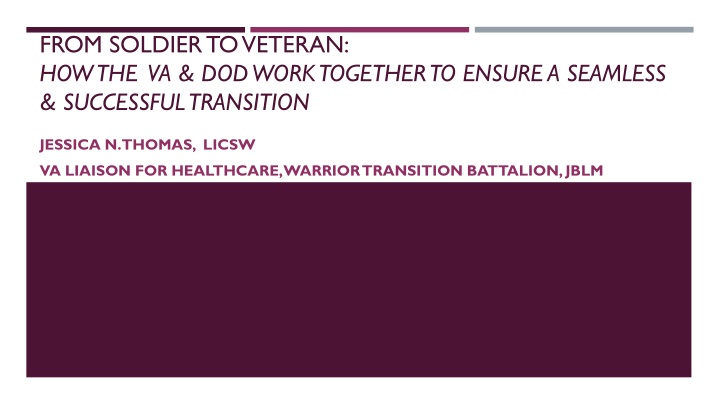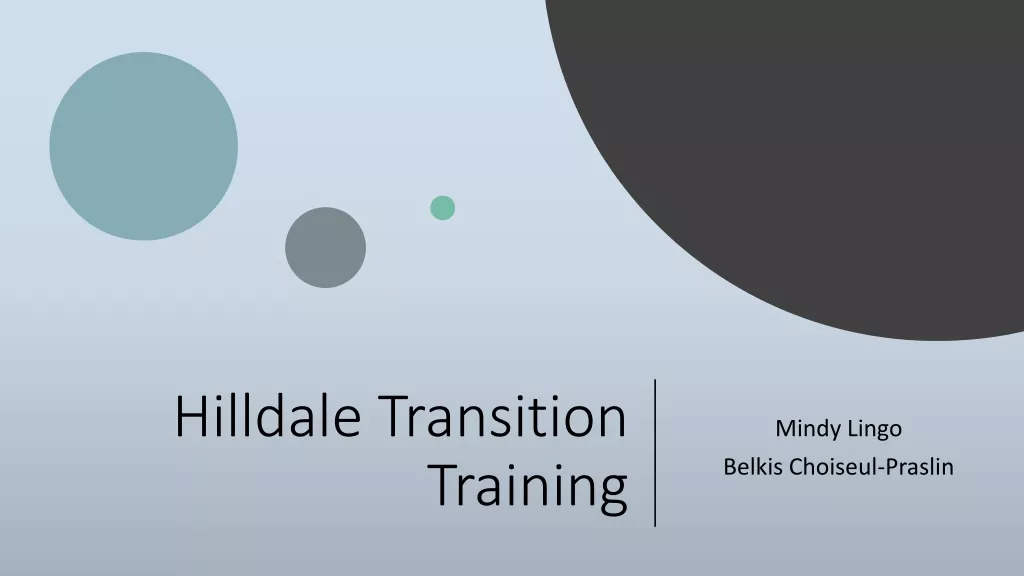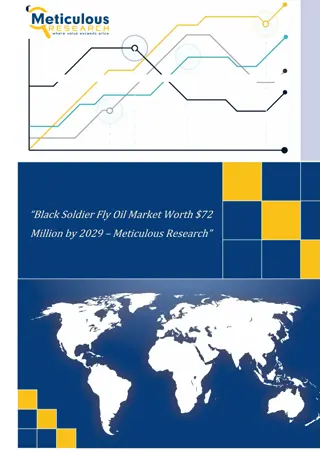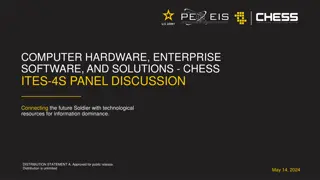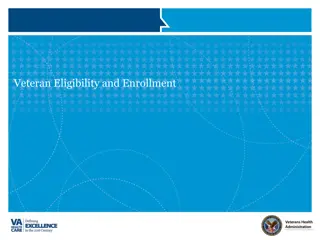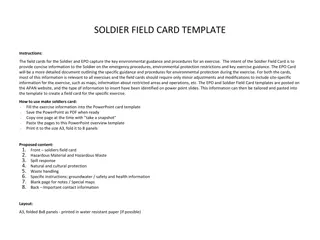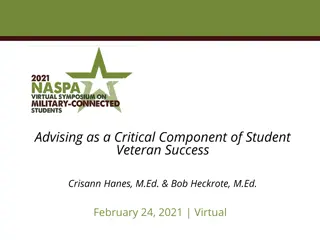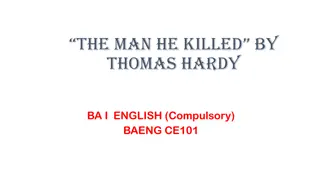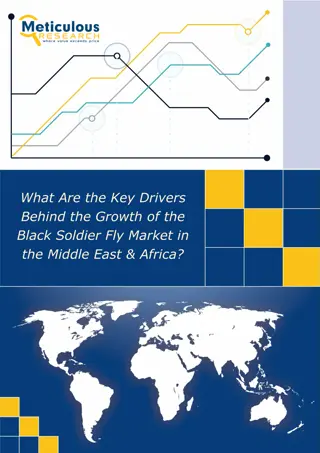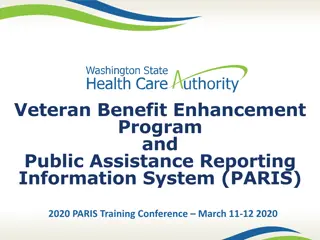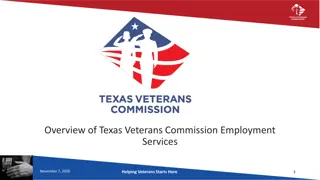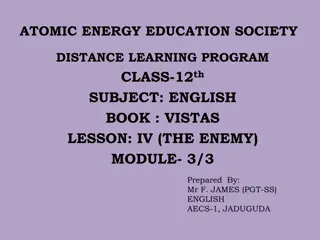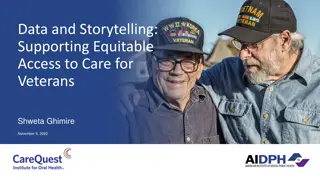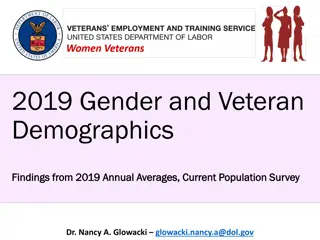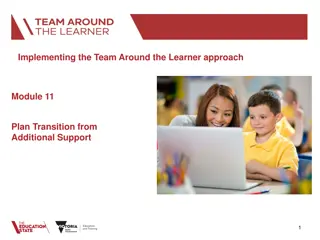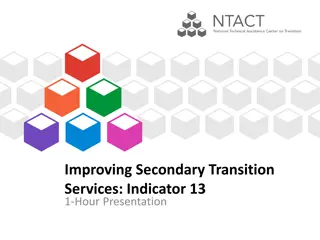Ensuring a Seamless Transition from Soldier to Veteran
Learn how the VA and DOD collaborate to facilitate a successful transition for soldiers turning veterans. Explore programs like Soldier For Life-Transition Assistance, collaborations between DOD, VHA, and VBA, and initiatives for underserved populations such as Mental Health Executive Order and support for women and LGBTQ veterans.
Download Presentation

Please find below an Image/Link to download the presentation.
The content on the website is provided AS IS for your information and personal use only. It may not be sold, licensed, or shared on other websites without obtaining consent from the author.If you encounter any issues during the download, it is possible that the publisher has removed the file from their server.
You are allowed to download the files provided on this website for personal or commercial use, subject to the condition that they are used lawfully. All files are the property of their respective owners.
The content on the website is provided AS IS for your information and personal use only. It may not be sold, licensed, or shared on other websites without obtaining consent from the author.
E N D
Presentation Transcript
FROM SOLDIER TO VETERAN: HOW THE VA & DODWORK TOGETHER TO ENSURE A SEAMLESS & SUCCESSFUL TRANSITION JESSICA N. THOMAS, LICSW VA LIAISON FOR HEALTHCARE, WARRIOR TRANSITION BATTALION, JBLM
DOD & VATRANSITION PROGRAMS: 1. DOD programs that are specific to ALL transitioning Soldiers: Soldier For Life-Transition Assistance Program- redesigned due to increased concern around Soldier transition 2. Collaborations between DOD, VHA and the VBA: VA Liaison for Healthcare, VBA on site and conducting trainings, IDES (MEB) 3. New programs & policies for historically underserved populations: Mental Health Executive Order, Military Sexual Trauma (MST) eligibility, Women Veterans, LGBT-Q population
SOLDIER FOR LIFE-TRANSITION ASSISTANCE PROGRAM The Soldier for Life Transition Assistance Program (SFL-TAP) is a centrally funded commanders program that provides transition assistance services to eligible Soldiers. Commanders are responsible for ensuring each Soldier has time to attend this training. SFL-TAP consists of a two-hour preparation counseling session, attendance at a 3 day Department of Labor Employment Workshop (DOLEW), 6 hrs of VA Healthcare and Veteran Benefits briefs, including in enrolling in e-Benefits, my HealtheVet and VA healthcare online. (SMs are able to enroll in VHA 180 days prior to d/c) Soldiers who are retiring can participate in SFL-TAP within 24 months of retirement, and 12-18 months for all other Soldiers. At the conclusion of SFL-TAP Servicemembers will have received an average of 40 hours of classes/trainings including completion of 8 online courses in order to successfully complete SFL-TAP program.
COLLABORATIONS BETWEEN DOD & VHA Collaboration #1: VA Liaison for Healthcare (Transition & Care Management Program) VA Liaisons stationed at Military Treatment Facilities (MTFs) or Warrior Transition Battalion support the transfer of service members who need continued medical care. They coordinate care and provide consultation about VA resources and treatment options. Liaisons will contact the service member's local VA Medical Center and Transition Care Management (TCM) Team to ensure that appointments and care plans are in place before the service member leaves the MTF. VA Liaisons at the WTB & MTF are apart of the Soldiers multi-disciplinary team, but work closely with providers across post to ensure any Soldier is afforded the ability to be connected to their local VA, TCM Team and potentially assigned a case manager for 90 days. Priority: SI/I, Vulnerable (SA/SI, pregnant, at risk of homelessness, MH), Chapters, Combat Veterans
COLLABORATIONS BETWEEN DOD & VBA Collaboration #2: Veteran Benefit Administration : Every post has VBA reps and Veteran Service Officers who work with the TAP in order to assist Soldiers who will be transitioning out of the Service to apply for a Service Connected Disability. Soldiers are encouraged to participate in the Benefits Delivery at Discharged (BDD) program. BDD: 180 days ETS physical Medical Records Attend evaluations for claims while on AD **If granted a service connected disability from the VA, Soldiers should receive their benefits within 2-3 months after discharge.
COLLABORATIONS BETWEEN DOD & VHA & VBA Collaboration #3: IDES When a SM is wounded, injured or fall ill while on AD and they are no longer able to perform their duties, they will be referred to the Integrated Disability Evaluation System (IDES). Through this collaborative the VA & DOD work together to make disability evaluation simple, fast and fair. If the SM is found to be medically unfit for duty, IDES will give them a proposed VA disability rating before they leave the service. During the Medical Evaluation Board Soldiers are assigned the following personnel to assist them with their transition: Physical Evaluation Board Liaison Officer (PEBLO) which guides SMs through IDES process & assists with DOD Benefits Military Service Coordinator (MSC) who will assist them with VA compensation claims/benefits with in IDES Vocational Rehabilitation Counselor (VRC) to assist them with Vocational Rehabilitation & Employment services to prepare them for transition VA Liaison for Healthcare to complete the VA Referral, obtaining an initial VA appointment and connecting the SM to the TCM team to prior to leaving JBLM.
NEW POLICIES: MENTAL HEALTH EXECUTIVE ORDER Mental Health Executive Order Supporting our Veterans during their transition from Uniformed Service to Civilian Life Jan 2019 President Trump Directs the U.S. Department of Veteran Affairs, DOD, and DHS to work together to ensure newly discharged Service members and Veterans have access to any needed mental health care for at least 1 year following their discharge from military service. Service members with an OTH discharge may receive emergent mental health care from VA, and servicemembers who have an OTH can receive mental health care for conditions incurred or aggravated during active duty service. How: Servicemembers will be offered VA Healthcare registration pre-transition (via e-Benefits & VA Liaison s) by modifying the Transition Assistance Program (TAP) guidelines and increasing VSO involvement.
NEW PROGRAMS: MILITARY SEXUAL TRAUMA & VA ELIGIBILITY Military Sexual Trauma (MST) and Mental Health Eligibility- May 2016, Updated 2018 The Department of Veteran Affairs has a wide range of outpatient, inpatient and residential services available to assist Veterans in their recovery from MST. All treatment for mental and physical health conditions related to MST is provided free of cost. Veterans do NOT need to be service connected and eligibility for MST related health care is independent of receipt of other VA Benefits. No income limit, no reporting or documentation required, no length of service MST Coordinator- Every VA facility must have one Relaxed standards in filing for VA compensation for MST related issues.
NEW PROGRAMS: LGBT & RELATED IDENTITIES LGBT and Related Identities Veterans may have other ways of describing themselves so the term is an inclusive term for sexual and gender minorities. Veterans Care Coordinator at every facility to assist Veterans in receiving the specialized care needed. VA Healthcare includes: Hormone Treatment Substance use/alcohol treatment Tobacco use treatment Treatment and prevention of STIs /PrEP Intimate partner violence reduction and counseling Heart health Cancer screening, prevention and treatment Consults for counseling to discuss transitioning or an evaluation for hormone therapy
TRANSITION & VA INFORMATION www.va.gov Department of Veteran Affairs www.ebenefits.gov Apply for Healthcare & Compensation Benefits www.benefits.va.gov VA Transition Assistance Program (TAP) www.oefoif.va.gov VA Liaison for Healthcare & Transition and Care Management Program
